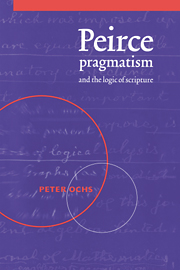Book contents
- Frontmatter
- Contents
- List of abbreviations
- PART I Peirce's pragmatic writing
- 1 Introduction: reading Peirce's pragmatism
- 2 Pragmatic methods of reading and interpretation
- 3 Problems in Peirce's early critique of Cartesianism
- 4 Problems in Peirce's early theory of pragmatism
- 5 Problems in Peirce's normative theory of pragmatism, 1878–1903
- 6 A pragmatic reading of Peirce's lectures on pragmatism
- PART II Peirce's pragmaticist writing
- Notes
- Index
6 - A pragmatic reading of Peirce's lectures on pragmatism
Published online by Cambridge University Press: 22 October 2009
- Frontmatter
- Contents
- List of abbreviations
- PART I Peirce's pragmatic writing
- 1 Introduction: reading Peirce's pragmatism
- 2 Pragmatic methods of reading and interpretation
- 3 Problems in Peirce's early critique of Cartesianism
- 4 Problems in Peirce's early theory of pragmatism
- 5 Problems in Peirce's normative theory of pragmatism, 1878–1903
- 6 A pragmatic reading of Peirce's lectures on pragmatism
- PART II Peirce's pragmaticist writing
- Notes
- Index
Summary
This pragmatic reading assumes a style, and argues from out of a context, in between those of the pragmatic readings of Peirce's “Illustrations” (Chapter 4) and “Pragmaticism” (Chapter 8). Like the former reading, this one situates Peirce's pragmatism in the empiricist tradition of philosophy whose tensions it shares. Like the latter reading, this one also situates Peirce's pragmatism in a sub-community of pragmatic empiricists, whose errors it criticizes. The principal difference between the pragmatisms of the “Illustrations” and of the Lectures is that, in the latter, Peirce re-evaluates pragmatism rather than simply formulating it. The argument of the Lectures is decidedly apologetic, however, which marks its principal difference from the argument of the 1905 Monist essays. In the essays, Peirce writes as if he wants simply to recover the logic embedded in the practices of pragmatic inquirers. In the Lectures, he writes as if he wants still to prove that this is the logic of what his empiricist peers would want to practice, if they only reflected more soberly on what they do. The pragmatic reading of Peirce's Lectures is therefore doubly complex, because it portrays Peirce as masking, on at least two levels, his uncertainties about the empiricist practice of philosophy. On one level, it portrays his masking the radical character of his critique of empiricist logic: as if, in this way, he could get his empiricist peers to approve his thoroughly redefining their science. On a second level, the pragmatic reading portrays Peirce's masking an ambivalent relationship to the empiricists.
Information
- Type
- Chapter
- Information
- Peirce, Pragmatism, and the Logic of Scripture , pp. 128 - 158Publisher: Cambridge University PressPrint publication year: 1998
